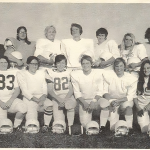For all of our thousands of years of evolution and technological advancements, we still have most of the social problems we’ve had since the beginning of recorded history:
- War
- Poverty
- Hunger
- Racism
- Inequality
- Religious Persecution
To my mind, it is completely irresponsible of us, as a species, to continue to try to build a better telephone or automobile when we have not mastered even the most basic social problems. To that end, I believe that we all, every single one of us, needs an education in healthy relationships – mostly because we, as a species, have absolutely no idea what “healthy relationships” mean. For the most part, we have never seen healthy relationships modeled for us so, if we are to even approach healthy in our relationships, we will have to learn what that means.
Romantic Relationships
Many of us have heard of the concept of “healthy relationships” applied to our romantic relationships. Countless people have freed themselves of abusive relationships, many have even gone to some kind of educational class or support group as a result, where the concept of healthy vs. unhealthy was discussed, but sadly, many of those same people repeat their old unhealthy patterns when faced with their next romantic relationship.
There is nothing intuitive about healthy relationships for us. We cannot rely on the messages and behaviors of parents, mentors, or teachers, who themselves have mostly only known and witnessed unhealthy relationships. Some of us, over the course of our lives, may feel like we have witnessed healthy relationships, but very often what we have witnessed is only a small window into a relationship that may or may not be truly healthy in the long term.
Worst of all, people who are not likely to examine their lives, their behaviors or the behaviors of others, unconsciously repeat what they see as “normal”, thereby hurting others and spreading the same kind of misinformation regarding how to treat others and how we ourselves should expect to be treated. Abuse is tolerated because “My parents used to scream and fight with each other all the time” and also because abusive relationship patterns are normalized through things like movies and television.
Parenting
We see much less discussion about healthy relationships in terms of parenting. I have been asking for years, “Why don’t we teach about healthy relationships in high school?” The answer I get is always the same, “They tried years ago, but had to stop when angry parents objected to the school for ‘undermining’ their parental authority.” Apparently, when kids learn what constitutes healthy relationships, they can see quite clearly that their home life is not a healthy example.
This should shock us all. Imagine the scene: An angry and abusive parent storms into the school wanting to talk to (intimidate) the principal because their kid came home and said, “You can’t treat me like that, it’s unhealthy!” Instead of protecting the child, the school says, “Wow, we better not give these kids this information for fear their abusive parents will direct their aggression toward us!” Wow. Really? No wonder most adults have absolutely no clue what constitutes a healthy relationship!
Friendship
Most of us have had an unhealthy friendship at some point in our lives. Of course, most relationships don’t start off unhealthy; people don’t like to hang out with people who treat them like crap. But, in many cases, over time, as a person feels more comfortable with another, they may begin to take liberties: they might take the other person for granted or they might become less careful of how they say something, assuming the other will understand even if their words seem hurtful. Eventually, people find themselves committed to a friend who treats them like crap on a regular basis.
Business
For some reason, our culture doesn’t recognize any value in promoting healthy business or work relationships. Too many bosses see their employees as a hassle or worse, as people who are “taking part of their profits” without recognizing the value that workers or even other business contractors provide.
Nobody in this world makes money without the help of others. This is important, so I will say it again. NOBODY IN THIS WORLD MAKES MONEY WITHOUT THE HELP OF OTHERS. If you don’t believe me, I invite you to go into a room, alone, with no Internet or telephone and see how much money you can make on your own. At the very least, even if you provide a service and sell it yourself, you must have people to buy it. Business is a community enterprise that invariably suffers or becomes a burden to society when profits are the only consideration.
Community
This is another area where people don’t really think about healthy relationships, which is odd because the word community implies relationships. Personally, I love the concept of community; a group of people entered into an informal social contract to work together and accomplish things no one could on their own. Thanks to community, we have electricity, running water, roads, railroads, airports. We have parks, schools, houses of worship and social programs, all designed for the good of all. One thing we don’t tend to have is respect or consideration for our neighbors.
Let’s take Food Stamps as an example. With every paycheck, every American pays into Food Stamps as insurance against the day that they will not be able to afford food due to an unforeseen circumstance such as an illness, job loss or death of a spouse. But when that day comes, suddenly one’s neighbors are now looking down their nose at the “freeloader” who is actually making use of a program they’ve paid into their whole lives. This negative judgment and complete lack of respect is not anything close to healthy. In fact, it could be argued that this kind of judgmental mentality is actually abusive. It certainly does nothing to build a strong community.
What Can We Do?
Clearly, something does have to be done. At this point, children are being raised by people who have no idea what “healthy” even means. Compounded over generations, our species is on the brink of self-annihilation as violence, negative judgment and a total lack of consideration for our fellow men runs rampant around the globe. It’s a big job that we must all commit to if there is to be any hope.
It Starts With You
One person is not going to single-handedly change the world and make it a better place for all. Each and every one of us has a responsibility to examine our own behavior, judgments and beliefs to determine if we are treating our fellow humans in a healthy way. Be aware that your own internal guidance cannot be relied upon; you must seek out the information and apply it to your life.
- Google “healthy relationships” – It’s a good start. You may be surprised at what you learn.
- Print it out and stick it on your fridge or bathroom mirror – One reading is not going to do it. You need to refer to this information again and again as you build new, healthy habits.
- Look beyond your romantic relationships – Yes, our romantic relationships generally get the most attention, but you are involved in a wide variety of relationships and they all need to be examined, and probably adjusted, if you are to live a healthy lifestyle.
- Teach your children – Don’t just “tell” them, SHOW them. Make it a goal that they will understand healthy relationships by the time they are grown. Talk to them about their first crushes and romantic choices. Help them resolve issues in a healthy way and encourage them to research what is healthy on their own.
- Start looking at your co-workers, employees and neighbors as human beings with whom you are having a relationship. Examine your behavior toward them and reject abuse directed at you.
Imagine a world where people treated each other with kindness, compassion and respect as a rule. Imagine how things like disrespect and abuse would stand out in such a world. War and greed, even pollution would not be able to proliferate in a world where healthy relationships were the norm. The world won’t change over night, but if enough of us can understand and commit to this concept, we could make a very different world indeed.



